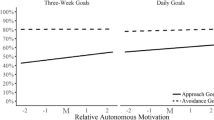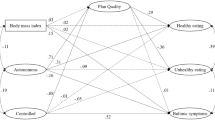Abstract
The present study hypothesized that unfulfilled basic needs for autonomy, competence and relatedness (SDT, Deci and Ryan, Psychol Inq 11:227–268, 2000) are associated with the impulse to eat and with binge eating. In addition, we assumed that individuals with a high achievement motive, who are characterized by high self-control competences, have the same impulse to eat when confronted with unfulfilled basic needs, but are better able to control the impulse to binge eat than individuals with a low achievement motive. In accordance with these hypotheses, unfulfilled basic needs significantly positively predicted the impulse to eat as well as binge eating behavior. As also expected, the achievement motive did not moderate the effect of unfulfilled needs on the impulse to eat, but did influence the effect of unfulfilled needs on binge eating. The results are discussed in terms of a broader debate about the interaction between basic needs and implicit motives.

Similar content being viewed by others
Notes
According to the World Health Organization (2000), the normal range of the BMI is between 18.50 and 24.99. The definition of underweight is a BMI of less than 18.50. Overweight is defined by a BMI higher than 25.00 and the cut-off criterion for obesity is a BMI higher than 30.00.
References
Aiken, L. S., & West, S. G. (1991). Multiple regression: Testing and interpreting interactions. Newbury Park, CA: Sage.
American Psychiatric Association. (1994). Diagnostic and statistical manual of mental disorders, Fourth Edition (DSM-IV). Washington, DC: American Psychiatric Press.
Atkinson, J. W., Heyns, R. W., & Veroff, J. (1958). The effect of experimental arousal of the affiliation motive on thematic apperception. In J. W. Atkinson (Ed.), Motives in fantasy, action, and society: A method of assessment and study (pp. 95–104). Princeton, NJ: Van Nostrand.
Bartholomew, K., Ntoumanis, N., & Thogersen-Ntoumani, C. (2010a). The controlling interpersonal style in a coaching context: Development and initial validation of a psychometric scale. Journal of Sport and Exercise Psychology, 32, 193–216.
Bartholomew, K. J., Ntoumanis, N., & Thøgersen-Ntoumani, C. (2010b). Self-determination theory and the prediction of ill-being in sport: The role of psychological need thwarting. Manuscript submitted for publication.
Brunstein, J. C., & Heckhausen, H. (2008). Achievement motivation. In H. Heckhausen & J. Heckhausen (Eds.), Motivation and action (pp. 137–183). Cambridge, UK: Cambridge University Press.
Deci, E. L., & Moller, A. C. (2007). The concept of competence. In A. J. Elliot & C. S. Dweck (Eds.), Handbook of competence and motivation (pp. 579–597). New York: Guilford Press.
Deci, E. L., & Ryan, R. M. (1985). Intrinsic motivation and self-determination in human behaviour. New York: Plenum.
Deci, E. L., & Ryan, R. M. (2000). The “what” and “why” of goal pursuits: Human needs and the self-determination of behavior. Psychological Inquiry, 11, 227–268.
Deci, E. L., & Ryan, R. M. (2008). Facilitating optimal motivation and psychological well-being across life’s domains. Canadian Psychology, 49, 14–23.
Deci, E. L., & Vansteenkiste, M. (2004). Self-determination theory and basic need satisfaction: Understanding human development in positive psychology. Ricerche di Psichologia, 27, 17–34.
Diehl, J. M., & Staufenbiel, T. (1994). Inventar zum Essverhalten und Gewichtsproblemen (IEG)[Inventory on eating behavior and body weight problems]. Eschborn, Germany: Klotz.
Downe, K. A., Goldfein, J. A., & Devlin, M. J. (2009). Restraint, hunger, and disinhibition following treatment for binge-eating disorder. International Journal of Eating Disorders, 42(6), 495–504.
Gagné, M. (2003). The role of autonomy support and autonomy orientation in prosocial behavior engagement. Motivation and Emotion, 27, 199–223.
Grunert, S. C. (1989). Ein Inventar zur Erfassung von Selbstaussagen zum Ernährungsverhalten. Diagnostica, 35, 167–179.
Haiman, C., & Devlin, M. J. (1999). Binge eating before the onset of dieting: A distinct subgroup of bulimia nervosa? International Journal of Eating Disorders, 25, 151–157.
Heatherton, T. F. (1993). Body dissatisfaction, self-focus, and dieting status among women. Psychology of Addictive Behaviors, 7, 225–231.
Heatherton, T. F., Herman, C. P., & Polivy, J. (1991). Effects of physical threat and ego threat on eating behaviour. Journal of Personality and Social Psychology, 60, 138–143.
Hoppa, H., & Hallstrom, T. (1981). Weight gain in adulthood in relation to socioeconomic factors, mental illness, and personality traits: A prospective study of middle-aged women. Journal of Psychosomatic Research, 25, 83–89.
Hsu, L. K. G. (1990). Eating disorders. New York: Guilford Press.
Illardi, B. C., Leone, D., Kasser, R., & Ryan, R. M. (1993). Employee and supervisor ratings of motivation: Main effects and discrepancies associated with job satisfaction and adjustment in a factory setting. Journal of Applied Social Psychology, 23, 1789–1805.
Jacobi, C., Hayward, C., de Zwaan, M., Kraemer, H. C., & Agras, W. S. (2004). Coming to terms with risk factors for eating disorders: Application of risk terminology and suggestions for a general taxonomy. Psychological Bulletin, 130(1), 19–65.
Kashdan, T. B., Julian, T., Merritt, K., & Uswatte, G. (2006). Social anxiety and posttraumatic stress in combat veterans: Relations to well-being and character strengths. Behavior Research and Therapy, 44, 561–583.
Kasser, T., & Ryan, R. M. (1996). Further examining the American dream: Differential correlates of intrinsic and extrinsic goals. Personality and Social Psychology Bulletin, 22, 80–87.
Keys, A., Brozek, J., Hentschel, A., Mickelsen, O., & Taylor, H. L. (1950). The biology of human starvation. Minneapolis: University of Minnesota Press.
Larsen, J. K., Van Strien, T., Eisinga, R., Herman, C. P., & Engels, R. C. M. E. (2007). Dietary restraint: Intention versus behavior to restrict food intake. Appetite, 49, 100–108.
Lavie, C. J., Milani, R. V., & Ventura, H. O. (2009). Obesity and cardiovascular disease: Risk factor, paradox, and impact of weight loss. Journal of American College of Cardiology, 53(21), 1925–1932.
Macht, M. (2008). How emotions affect eating: A five-way model. Appetite, 50, 1–11.
Marchi, M., & Cohen, P. (1990). Early childhood eating behaviors and adolescent eating disorders. Journal of the American Academy of Child and Adolescent Psychiatry, 29, 112–117.
McCann, B. S., & Bovbjerg, V. E. (1998). Promoting diatary change. In S. A. Shumaker, E. B. Schron, J. K. Ockene, & W. L. McBee (Eds.), The handbook of health behavior change (2nd ed., pp. 166–188). New York: Springer.
McClelland, D. C. (1985). Human motivation. Glenview, IL: Scott, Foresman.
McClelland, D. C., Atkinson, J. W., Clark, R. A., & Lowell, E. L. (1953). The achievement motive. New York: Appleton-Century-Crofts.
McClelland, D. C., Koestner, R., & Weinberger, J. (1989). How do self-attributed and implicit motives differ? Psychological Review, 96(4), 690–702.
Mischel, W. (1961). Delay of gratification, need for achievement, and acquiescence in another culture. Journal of Abnormal and Social Psychology, 62, 543–552.
Mischel, W. (1973). Toward a cognitive social learning re-conceptualization of personality. Psychological Review, 80, 252–283.
Mischel, W. (1996). From good intentions to willpower. In P. M. Gollwitzer & J. A. Bargh (Eds.), The psychology of action: Linking cognition and motivation to behavior (pp. 197–218). New York: Guilford Press.
Mischel, W., & Gilligan, C. (1964). Delay of gratification, motivation fort he prohibited gratification, and responses to temptation. Journal of Abnormal and Social Psychology, 69, 411– 417.
Mitchell, J. E., Hatsukami, D., Eckert, E. D., & Pyle, R. L. (1985). Eating disorders questionnaire. Psychopharmacological Bulletin, 21, 1025–1043.
Murray, H. A. (1943). Thematic apperceptive test manual. Cambridge: Harvard University Press.
Nangle, D. W., Johnson, W. G., Carr-Nangle, R. E., & Engler, L. B. (1994). Binge eating disorder and the proposed DSM-IV criteria: Psychometric analysis of the questionnaire of eating and weight patterns. International Journal of Eating Disorders, 16(2), 147–157.
Pelletier, L. G., Dion, S. C., Slovinec-D’Angelo, M., & Reid, R. (2004). Why do you regulate what you eat? Relationships between forms of regulation, eating behaviors, sustained dietary behavior change, and psychological adjustment. Motivation and Emotion, 28(3), 245–277.
Ryan, R. M., & Deci, E. L. (2008). Self-determination theory and the role of basic psychological needs in personality and the organization of behavior. In O. P. John, R. W. Robins, & L. A. Pervin (Eds.), Handbook of personality psychology: Theory and research (3rd ed., pp. 654–678). New York, NY: Guilford.
Schüler, J., & Brandstätter, V. (2010). How basic need satisfaction and dispositional motives interact in predicting flow experience in sport. Manuscript submitted for publication.
Schüler, J., Sheldon, K. M., & Fröhlich, S. M. (2010). Implicit need for achievement moderates the relationship between felt competence and subsequent motivation. Journal of Research in Personality, 44, 1–12.
Schultheiss, O. C. (2008). Implicit motives. In O. P. John, R. W. Robins, & L. A. Pervin (Eds.), Handbook of personality: Theory and research (3rd ed., pp. 603–633). New York: Guilford.
Schultheiss, O. C., & Brunstein, J. C. (2005). An implicit motive perspective on competence. In A. J. Elliot & C. Dweck (Eds.), Handbook of competence and motivation (pp. 31–51). New York: Guilford.
Schultheiss, O. C., & Pang, J. S. (2007). Measuring implicit motives. In R. W. Robins, R. C. Fraley, & R. Krueger (Eds.), Handbook of research methods in personality psychology (pp. 322–344). New York: Guilford.
Sheldon, K. M., & Schüler, J. (2010). Wanting, having, and needing: Integrating motive disposition theory and self-determination theory. Manuscript submitted for publication.
Sheldon, K. M., Ryan, R. M., Deci, E. L., & Kasser, T. (2010). The independent effects of goal contents and motives on well-being: It’s both what you pursue and why you pursue it. Personality and Social Psychology Bulletin, 30(4), 475–486.
Smith, C. P. (1992). Motivation and personality: Handbook of thematic content analysis. NY: Cambridge University Press.
Spoor, S. T. P., Bekker, M. H. J., Van Strien, T., & Van Heck, G. L. (2007). Relations between negative affect, coping, and emotional eating. Appetite, 48, 368–376.
Stein, R. I., Kenardy, J., Wiseman, C. V., Dounchis, J. Z., Arnow, B. A., & Wilfley, D. E. (2007). What’s driving the binge in binge eating disorder?: A prospective examination of precursors and consequences. International Journal of Eating Disorders, 40, 195–203.
Stok, F. M., De Ridder, D. T. D., Adriaanse, M. A., & De Wit, J. B. F. (2010). Looking cool or attaining self-rule. Different motives for autonomy and their effects on unhealthy snack purchase. Appetite (in press).
Strauss, J., & Ryan, R. M. (1987). Autonomy disturbances in subtypes of anorexia nervosa. Journal of Abnormal Psychology, 96, 254–258.
Thogersen-Ntoumani, C., & Ntoumanis, N. (2007). A self-determination theory approach to the study of body image concerns, self-presentation and self-perceptions in a sample of aerobic instructors. Journal of Health Psychology, 12, 301–315.
VanIttalie, T. B., & Lew, E. A. (1992). Assessment of morbidity and mortality risk in the overweight patient. In T. A. Wadden & T. B. VanIttalie (Eds.), Treatment of the seriously obese patient (pp. 3–32). New York: Guilford Press.
van Strien, T., Frijters, J. E. R., Bergers, G. P. A., & Defares, P. B. (1986). The Dutch Eating Behavior Questionnaire (DEBQ) for assessment of restrained, emotional, and external eating behaviour. International Journal of Eating Disorder, 5, 295–315.
Winter, D. G. (1991). Measuring personality at a distance: Development of an integrated system for scoring motives in running text. In D. J. Ozer, J. M. Healy, & A. J. Stewart (Eds.), Perspectives in personality (Vol. 3, pp. 59–89). London: Jessica Kingsley.
Winter, D. G. (1994). Manual for scoring motive imagery in running text (4th ed.). Department of Psychology, University of Michigan: Ann Arbor. Unpublished manuscript.
WHO (2000). Obesity: preventing and managing the global epidemic. Report of a WHO Consultation. WHO Technical Report Series 894. Geneva: World Health Organization, 2000.
Wott, C. B., & Carels, R. A. (2010). Overt weight stigma, psychological distress and weight loss treatment outcomes. Journal of Health Psychology, 15, 608–614.
Author information
Authors and Affiliations
Corresponding author
Rights and permissions
About this article
Cite this article
Schüler, J., Kuster, M. Binge eating as a consequence of unfulfilled basic needs: The moderating role of implicit achievement motivation. Motiv Emot 35, 89–97 (2011). https://doi.org/10.1007/s11031-010-9200-y
Published:
Issue Date:
DOI: https://doi.org/10.1007/s11031-010-9200-y




